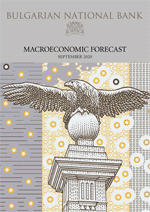Macroeconomic Forecast of the BNB, December 2020
The BNB forecast of key macroeconomic indicators is based on information published by 22 December 2020 and employs assumptions about global economic developments and price dynamics of main commodity groups in the international markets by 11 December 2020.
The increased number of new COVID-19 cases over the last quarter of 2020 led to re-tightening of containment measures in other EU countries and Bulgaria, which will affect negatively the economic activity during the quarter, though to a lesser extent than in the spring of 2020. When making the forecast, it has been assumed that containment measures imposed in the fourth quarter in other EU countries and Bulgaria would be extended until the end of the first quarter of 2021. Under the baseline forecast scenario, real GDP of Bulgaria will decrease by 4.4 per cent in 2020, reflecting mainly a negative contribution of net exports and, to a lesser degree, private investment declines. The fiscal policy is expected to have a strong countercyclical effect, contributing positively to the economic activity through higher national government consumption and investment and increased net transfers to households. Private consumption will also have a positive contribution to real GDP in 2020, with NSI data showing its considerable resilience throughout the first nine months against the background of the registered economic activity declines. In line with the assumptions about external environment developments and gradual containment of the pandemic in 2021–2022, economic activity is predicted to rise by 3.7 per cent in 2021 and 3.6 per cent in 2022, reaching its annual pre-pandemic level in 2022. Projected resumption of real GDP growth in 2021 would reflect mainly a transition from a negative to a positive contribution of net exports and fixed capital investment, while private consumption would continue to be the sub-component with the largest positive contribution to GDP changes throughout the year. GDP growth in 2022 will be primarily driven by positive contributions of private consumption and fixed capital investment.
Annual inflation is expected to be 0.3 per cent at the end of 2020 (3.1 per cent at the end of 2019). The decrease in inflation from December 2019 is due to all major sub-groups of goods and services, with slowdown most pronounced in energy prices in line with downward dynamics of international oil prices on an annual basis. Headline inflation is expected to accelerate to 2.0 per cent at end-2021, reflecting largely increased oil prices and higher inflation in domestic food prices and core inflation, thereafter slowing during 2022 to 0.9 per cent in the context of stabilising international commodity prices.
Risks to the baseline scenario of the macroeconomic projection are assessed as oriented towards a larger decline in economic activity in 2020 and a slower subsequent recovery over the remainder of the forecast horizon. A probable failure to effectively cope with the COVID-19 spread globally and in Bulgaria poses the most significant risk to materialisation of weaker economic activity during the whole projection horizon compared to the baseline scenario. This would subdue for a longer than projected period foreign trade flows and expenditure on consumption and investment of households and corporations. Risks to the inflation outlook are considered as largely oriented towards lower inflation, and are related to probable weaker inflation in energy products and core HICP components.






